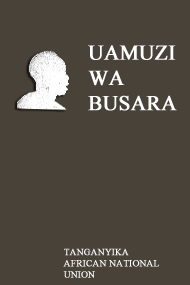Speech by the President Julius K. Nyerere to the National Assembly on Economy, 1965-1967
Speech by the President of the United Republic of Tanzania, Mwalimu Julius K. Nyerere, to the National Assembly: Monday, June 13th 1966 on Our Economy 1965-1967
This is the third year running in which I have addressed the National Assembly during its Budget session. In 1964 I introduced the Five-Year Development Plan for Tanganyika, and commended it for your attention. In 1965 I announced the forthcoming Dissolution of Parliament and, at the,same time, gave a brief survey of the nations' progress during the first months of the Development Plan.
This year I, shall be making no specific announcement about big changes,in policy but I am able to tell you that the draft Economic Development Plan for Zanzibar has now been received by the Zanzibar Government and the Union (government and is under consideration; It is also my intention today to give a general assessment of the advances we have made with the existing, Plan, and of the setbacks we' have experienced in certain fields. I have! chosen to do this now, despite the fact that we have hot yet completed the second year's work on the Plan because of the importance of the subjects you will be discussing in the coming weeks.
You will be considering Government's Budget proposals for the coming financial year in other words, you will be considering how much1 money should be taken out | of the pockets of your constituents and spent by Government, and in what manner any such money should be allocated…

